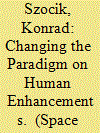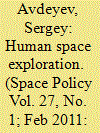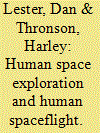|
|
|
Sort Order |
|
|
|
Items / Page
|
|
|
|
|
|
|
| Srl | Item |
| 1 |
ID:
169336


|
|
|
|
|
| Summary/Abstract |
Among the greatest obstacles to the implementation of crewed space missions are human biological limitations. Difficulties were always envisioned in relation to both Earth's moon and Mars but more so for Mars because long spaceflights would also expose crew to prolonged microgravity conditions, in addition to radiation. The result could well be osteoporosis, bone fractures, and disability. In this article, we do not contest the validity of bone loss studies. Rather, we question a seemingly tacit assumption about the immutability of human nature. Indeed, new, invasive, and noninvasive techniques of human enhancement already allow humans to enjoy modifications that will enable lengthy space missions. The alteration of human DNA has not only aided cancer patients but, for example, by using the CRISPR/Cas9 genome editing procedure, can also help to prevent damage to limbs and joints that a prolonged Mars mission could cause for the crew. Possible ethical objections to this solution are discussed, and trade-offs between risks and benefits outlined.
|
|
|
|
|
|
|
|
|
|
|
|
|
|
|
|
| 2 |
ID:
105512


|
|
|
|
|
| Publication |
2011.
|
| Summary/Abstract |
This Viewpoint is a slightly edited version of the 'Statement by Space Explorers on Human Space Exploration' produced in the wake of a workshop organized by the European Space Policy Institute and held in Vienna in May 2010. While noting the cultural differences in understandings of 'exploration' around the world, it also affirms the phenomenon as a globe-wide, human urge, emphasizing that only the physical presence of a human being can assure the full emotional quality of exploration. It calls upon decision makers to regard human space exploration as a global trans-cultural quest that should be supported and furthered.
|
|
|
|
|
|
|
|
|
|
|
|
|
|
|
|
| 3 |
ID:
106910


|
|
|
|
|
| Publication |
2011.
|
| Summary/Abstract |
The role of telerobotics for space exploration in placing human cognition on other worlds is limited almost entirely by the speed of light, and the consequent communications latency that results from large distances. This latency is the time delay between the human brain at one end, and the telerobotic effector and sensor at the other end. While telerobotics and virtual presence is a technology that is rapidly becoming more sophisticated, with strong commercial interest on the Earth, this time delay, along with the neurological timescale of a human being, quantitatively defines the cognitive horizon for any locale in space. That is, how distant can an operator be from a robot and not be significantly impacted by latency? We explore that cognitive timescale of the universe, and consider the implications for telerobotics, human spaceflight, and participation by larger numbers of people in space exploration. We conclude that, with advanced telepresence, sophisticated robots could be operated with high cognition throughout a lunar hemisphere by astronauts within a station at an Earth-Moon L1 or L2 venue. Likewise, complex telerobotic servicing of satellites in geosynchronous orbit can be carried out from suitable terrestrial stations.
|
|
|
|
|
|
|
|
|
|
|
|
|
|
|
|
|
|
|
|
|